After you decide that you’re going to leave your floating home in paradise for a period of time, the first question is where??? After you’ve identified a general location, the next question is on the hard or in a marina”? In some cruising locales this may actually dictate the answer to the first question “where” since all facilities may not be available in all geographic areas. So this post will examine the pros and cons of leaving your boat in a marina or on the hard.
Winterlude has been left in a marina slip for all but one season the past 10 years. The first three years we owned her, we left her in Burnt Store Marina in Punta Gorda, Florida. We selected Burnt Store Marina for several valid reasons. Years later the same reasons were still valid when we chose to return to Burnt Store when we returned to the US in May 2010 for a “mini-refit”. While out cruising the Western Caribbean, we examined on the hard or in a marina options annually and in general opted for in the water except for one year at Shelter Bay Marina in Colon, Panama – we needed an out of the water survey for insurance, we needed bottom paint and a few other maintenance issues so it seemed like a good idea to leave the boat out of the water that year.
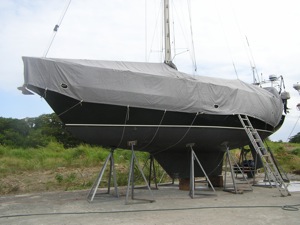
Leaving Your Boat On The Hard
Pros
1. The boat gets a chance to “dry out” … not being in the water, the bottom gets a chance to air and dry. We still have not determined if it’s a real benefit for the boat to “dry out”, I’ve not found research substantiating it one way or the other.
2. On the hard is generally less expensive than in the water. But you have to watch out and factor in the “extra” charges. Hauling and putting back in the water is usually similar to a month’s storage on the hard. Blocking is often extra. And if you plan to get a hotel room for a few nights before you leave and after you return, include the cost unless you do the same if the boat’s in the water. Plus often there’s a fixed cost for electricity that exceeds our usual monthly charge in the marina. Do the math and make sure you know what the savings is before you haul.
3. Some people think it’s safer – obviously the boat can’t sink.
4. You find out if you’ve developed blisters … oh wait, that may be a con and not an advantage.
5. It’s a good time for bottom paint and any other maintenance you can’t do while the boat’s in the water. The max-prop can be greased, the zincs easily changed, thru hulls can be replaced, cutlass bearings can be replaced. We haul when we need an insurance out of the water survey and try to coordinate bottom paint at the same time, although we’ll usually need bottom paint in the interim as well.
Cons
1. The hassle of hauling and putting the boat back when you return.
2. For me, those days living aboard right before you leave and just after you return are TORTURE. No facilities, climbing down a long ladder in my fog hazed sleep state in the middle of the night is an invitation to disaster! It’s hot, dusty, dirty and miserable (so now you know how I feel about life on the hard!) 🙂 You can get around this by paying to stay somewhere else for a few nights while you haul. But be sure to include the cost in your overall consideration of whether it’s really less expensive to haul the boat out.
3. Be careful with your bottom paint, make sure whatever kind of bottom paint you have can survive being out of the water.
4. Dirt. Because hauled boats are generally in boatyards, it’s much dirtier than in a marina … unless that marina happens to be by a boatyard … or Colon Panama!
5. Bug/critter issues. Bug and critters can be an issue either on the hard or in a marina depending on how you prepare. However, the only time we had an ant problem was on the hard in Shelter Bay, Colon, Panama. Winterlude was blocked just in front of a tree with massive ants. Despite our best efforts to treat the blocked stanchions, the ants crawled up and invaded anyway. It took months to get rid of them all! And the only boat we knew of that actually had a rat aboard was also on the hard. Beware of critters & bugs!
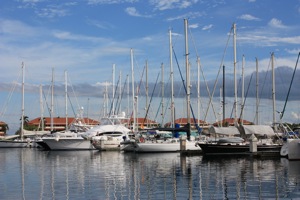
Leave Your Boat in a Marina
Pros
1. Convenience … When we return to the boat, it’s already in the water! We drag the sails out from the salon and can stay aboard the first night, albeit in a bit of chaos. Less hassle than to get the boat out and secured.
2. No extra haulout fees.
3. No climbing a hazardous ladder to access aboard.
4. Ease of access to SAILING. When we originally bought the boat in 2001, we knew we had 4 years before we could retire and spend six month a year aboard. Our goal was to spend at least 50 nights a year aboard in the early years. The biggest challenge lay in finding a marina where it was warm in the winter with easy and inexpensive transportation available from the Midwest and easy access to real sailing, not just ICW motoring. Of course, now we commuter cruise for six months at a time, so this issue isn’t as important.
Cons
1. Expense. Leaving the boat in a marina may or may not be more expensive than hauling and storing on the hard – do the math – see point #2 under Advantages above. For us, the cost savings was negligible until we returned to Florida. Every year we do a new assessment based on where we are leaving the boat for hurricane season.
2. Safety — if you’re in a hurricane area, some feel the boat is not as safe in a marina as on the hard. Personally, we weathered Hurricane Charley in the marina while some boats on the hard were knocked down. Damage to boats in the marina ranged from broken masts to sinking while other boats were fine. Damage on the hard generally consisted of a row of dominos from boats being blown over. Both options had damage.
3. Bottom Paint. Leaving the boat in the water insures the bottom will grow a fresh crop of something. We have ours cleaned every other month in Florida, but every month in the further south tropics. In Bocas Del Toro we even had the diver bag our prop to keep it from being a massive barnacle when we returned. The BIG problem with having the bottom cleaned every month (with ablative paint like ours) is that you shorten the life of your bottom paint.
After 10 years, we’re not convinced that there’s a right and wrong answer for the “in a marina or on the hard” question.
What do you think?
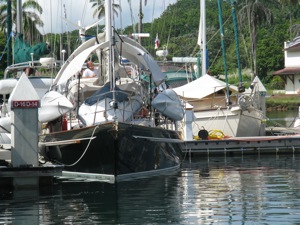

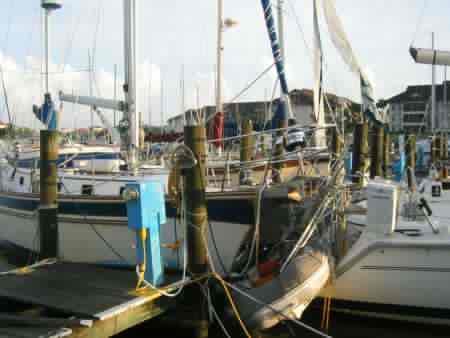
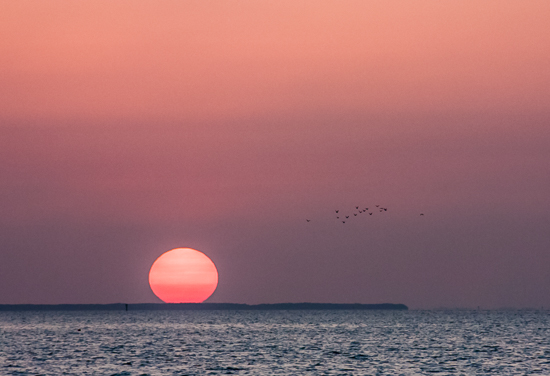







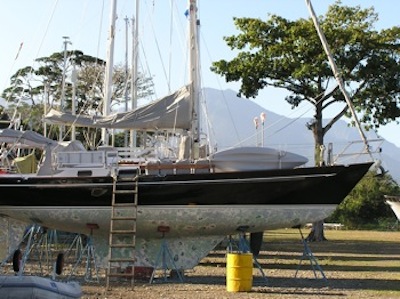
I favor leaving our boat on the hard for all of the reasons that you stated, as well as the terms of our insurance policy. Storage in a marina can be less work because you do less in terms of maintenance, but statistics show that most boats that sink do so at a dock while unattended.
I do think on the hard is the way to go as it is better for the boat longterm.
-Laminate dries out
-Corrossion on underwater part stops
-If you cover the boat the aging process more or less stops av you block UV-radiation.